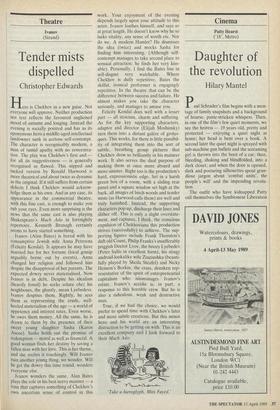Theatre
Ivanov (Strand)
Tender mists dispelled
Christopher Edwards
Here is Chekhov in a new guise. Not everyone will approve. Neither production nor text reflects the _ favoured anglicised mood of autumn and longing. Instead the evening is socially pointed and has as its eponymous hero a middle-aged intellectual landowner sunk in acetose self-contempt. The character is recognisably modern, a man of tumid apathy with no concentra- tion. The play was Chekhov's first and for all its suggestiveness — is generally recognised as flawed. This nipped and tucked version by Ronald Harwood is more theatrical and about twice as dynamic as the original. If it still suffers from certain defects I think Chekhov would acknow- ledge them as his own. And in any case, its appearance in the commercial theatre, with this fine cast, is enough to make you rub your eyes. Even more surprising is the news that the same cast is also playing Shakespeare's Much Ado in fortnightly repertoire. Kenneth Branagh certainly seems to have started something.
Ivanov (Alan Bates) is bored with his consumptive Jewish wife Anna Petrovna (Felicity Kendal). It appears he may have married her for her fortune (local gossip arguably borne out by events). Anna changed her religion and followed him despite the disapproval of her parents. The expected dowry never materialised. Now Ivanov is in debt. Despite his idealism (heavily foxed) he seeks solace chez his neighbours, the ghastly, mean Lyebedevs. Ivanov despises them. Rightly, he sees them as representing the crude, well- heeled materialism of the age — a world of appetency and interest rates. Even worse, he owes them money. All the same, he is drawn to them by the presence of their sweet young daughter Sasha (Karen Ascoe). Sasha holds out the promise of redemption — moral as well as financial. A good woman finds her destiny by saving a fallen man with her love. This is her theme, and she recites it touchingly. Will Ivanov ruin another young thing, we wonder. Will he get the dowry this time round, wonders everyone else.
Ivanov wonders the same. Alan Bates Plays the role in his best nervy manner — a tone that captures something of Chekhov's own uncertain sense of control in this
work. Your enjoyment of the evening depends largely upon your attitude to this actor. Ivanov loathes himself, and says so at great length. He doesn't know why he so lacks vitality, any sense of worth etc. Nor do we. A modern Hamlet? He dismisses the idea (twice) and mocks Sasha for finding him interesting. (Although self- contempt manages to take second place to sensual attraction: he finds her very kiss- able). Personally, I find the Bates line in self-disgust very watchable. Where Chekhov is dully repetitive, Bates the skilful, ironical performer is engagingly repetitive. In the theatre that can be the difference between success and failure. He almost makes you take the character seriously, and manages to amuse you.
Felicity Kendal does well with a lesser part — all stoicism, charm and suffering. As for the key supporting characters, adaptor and director (Elijah Moshinsky) turn them into a distant galore of grotes- ques. This works, for there is little possibil- ity of integrating them into the sort of subtle, breathing group pictures that Chekhov drew so brilliantly in his maturer work. It also serves the dual purpose of making them at once more absurd and more sinister. Right too is the production's hard, expressionistic edge. Set in a harsh green box of a room, with a sliding rear panel and a square window set high at the back, all images of birch woods and tender mists (as Harwood calls them) are well and truly banished. Instead, the supporting characters pop up, discharge their lines and slither off. This is only a slight overstate- ment, and captures, I think, the conscious expulsion of Chekhoviana this production strives (successfully) to achieve. The sup- porting figures include Frank Thornton's daft old Count, Philip Franks's insufferably priggish Doctor Lvov, the boozy Lyebedev (Peter Sallis in excellent form), his stingy android-lookalike wife Ziuziushka (beauti- fully played by Sheila. Steafel) and Nicky Henson's Borkin, the crass, drunken rep- resentative of the spirit of entrepreneurial capitalism who mismanages Ivanov's estate. Ivanov's accidie is, in part, a response to this horrible crew. But he is also a ridiculous, weak and destructive man.
True, if we had the choice, we would prefer to spend time with Chekhov's later and more subtle creations. But this minor hero and his world are an interesting distraction to be getting on with. This is an excellent company and I look forward to their Much Ado.
'Take .a hieroglyph, Miss Fayed.'


















































 Previous page
Previous page